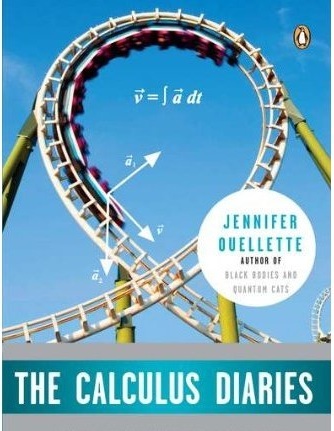The Calculus Diaries
As the holiday season begins, I recently felt compelled to read through a gift I received over the holidays last year, a book called The Calculus Diaries. Written by English major Jennifer Oullette, who, by her own admission, had to overcome a not uncommon fear mathematics to write it, the book attempts to do what any reasonable Calculus course ought to do, but in front of a larger audience: convince the reader of the universal applicability and beauty of the subject.

Unlike most Calculus textbooks, however, Oullette's book has an extra helping of sympathy for its audience. Oullette's goal is not necessarily to make her readers expert mathematics students; instead, she focuses on unifying seemingly disparate types of problems under the umbrella of Calculus. Included amongst these examples are applications of Calculus to the equations of motion, thermodynamics, surfing, and the spread of disease. The wheel is not being reinvented here - most of these examples (with the possible exception of what Calculus tells us about the optimal strategy in the event of a zombie outbreak) should be covered in a Calculus course. But since Oullette's goal is to appeal to the people who never took Calculus, this overlap is likely intentional.
Writing about mathematics for a general audience can be a difficult balancing act. If the language is too technical, the average reader may become confused and frustrated; on the other hand, if the language isn't technical enough, the reader may not learn much of anything, so what's the point of writing in the first place? Unfortunately, I found Oullette's book too frequently to be weighted towards the latter of these two extremes. Though the book has the word "Calculus" in the title, there's nary an equation to be found until the appendix, where all the scary mathematics has been relegated. While the main body of the text offers well-written explanations for the main ideas, ultimately the writing feels too broad because Oullette refuses to get into the nuts and bolts of Calculus even a little bit. I'm not saying we need another Calculus book in the market, but ultimately this book is extremely limited in its ability to describe what Calculus is actually like, because the very language of Calculus is barely used.
I realize, of course, that I am probably not the target audience for a book like this, so I asked my wife to read through the prologue and give me her thoughts. While she said she found the beginning of the book interesting, she didn't really seem compelled to continue reading. There isn't much I can infer from a sample size of one, but it seems to me like reading this book to try and overcome a fear of Calculus is a bit like reading books about French cooking and Louis XIV to try and overcome a fear of learning a foreign language. Useful applications are presented, but the nature of the beast itself is never really tackled.
Having said that, if you've never taken a Calculus course, or have no idea what the word "Calculus" really involves, this book may be a good starting point for you. It certainly won't make you an expert, or give you many problems to solve, but if you have a fear of mathematics, you can think of this as dipping your toe in the water.
Psst ... did you know I have a brand new website full of interactive stories? You can check it out here!

